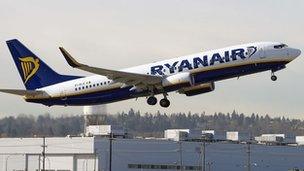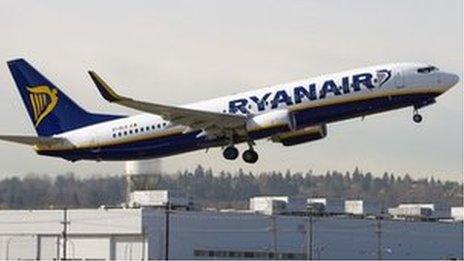Emergency landing at Prestwick
- Published

Ryanair is the only scheduled passenger airline using Prestwick
Prestwick Airport is of importance to the Ayrshire economy, which is why the Scottish government is willing to risk taking it over rather than see it close.
It's of less importance to air travellers and to the aviation industry, which is why the Scottish government has a challenge on its hands.
The first part of the challenge has been achieved. It's got political cover. Nicola Sturgeon, with responsibility for infrastructure, went out of her way to avoid being branded a socialist set on nationalisation.
She pointed out that public ownership of airports is already established and uncontroversial in the Highlands and Islands, and in many places further south.
Even Tories welcomed the move, on condition the airport is moved back into private hands before too long. They have previously been happy to buck the market when it comes to Prestwick.
When he was Ayr MP, the late George Younger went against the Thatcherite times by protecting its gateway status for Scotland's trans-Atlantic air traffic.
That anomaly and protection has since disappeared, which is one of the reasons Prestwick has been left exposed.
European drag
The Scottish government ought to be able to transfer ownership from New Zealand infrastructure firm Infratil.
Viewed from Wellington, just as Clydesdale Bank seems to be seen from its parent's Melbourne headquarters, it's one of those European assets that's not part of a balanced portfolio.
It merely looks like a drag on performance and a distraction from opportunities closer to home.
But having transferred ownership, that looks to be where the problems taxi for take-off. The reason it was hard to sell Prestwick is because it's loss-making, and it's getting squeezed by its rivals, by changes in the market and by its dominant customer.
Since a tiny Irish airline pulled out earlier this year, Ryanair is the only scheduled passenger airline using Prestwick.
It says it's committed to Prestwick. It has a significant maintenance base in a hanger at the airfield.
But Michael O'Leary's airline hasn't shown the level of commitment that can make the airport financially viable.
And given that he is notorious not only for his charging techniques with passengers but for his robust tactics to get fees down at the airports Ryanair uses, O'Leary now knows the Scottish government has to deal with him, on his terms, to avoid the airport closing.
By contrast, Infratil always had the option of closure.
Fewer airlines
Prestwick is also being squeezed by more aggressively competitive rivals at Edinburgh and Glasgow. They've started competing with each other since BAA was forced to divest one of them, choosing to make that Edinburgh.
That means they're going after all segments of the market, including the budget flyers with whom Prestwick has tried to carve a niche.
So if it buys Prestwick, the Scottish government is in charge of an asset which has to compete with the country's two biggest airports. That may not be a comfortable place to be, when it's trying also to work with them to meet other objectives.
What they all find is that there are fewer airlines to chase. The industry is consolidating. Before long, we may be down to five dominant European airlines; British Airways/Iberia, Air France/KLM, Lufthansa, EasyJet and Ryanair.
They'd prefer not to complicate their route map with multiple Scottish destinations, if they can avoid it.
So while price may take them to places like Prestwick, they'll also go the cities which they can sell most easily to their passengers. Ryanair, which uses Edinburgh for more of an inbound/outbound mix, is doing both, for now.
Hub and spokes
That adds up to very few options to secure Prestwick's future, while there's a big bill to bring its facilities up to scratch.
It's well suited to handling freight. There used to be a notion that such a big airport, away from cities, could be a distribution hub for big trans-Atlantic freight, gathering in from spokes across Europe, and sending it on its way west. And vice versa, of course.
Indeed, it was once believed that passenger traffic could head that way, and in a way it has, but focussing on the big city airports.
From whatever perspective, the market simply hasn't developed in a way that helps Prestwick. And its plight is a reminder that having three international airports competing across central Scotland is far from ideal.
Manchester Airport (owned by local councils) is showing how one hub for a large region can compete with London and develop international direct links. Scotland is more than a region, but lacks that focus of activity.
- Published2 October 2013
